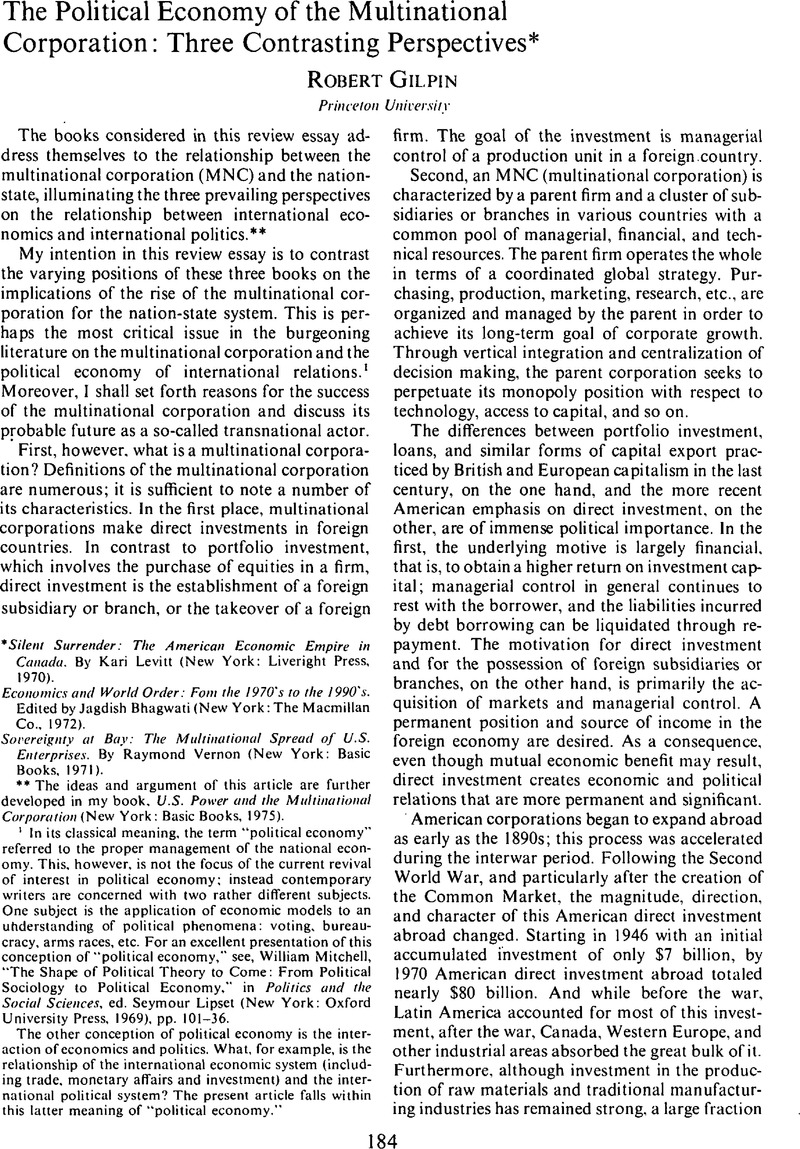Published online by Cambridge University Press: 01 August 2014

Silent Surrender: The American Economic Empire in Canada. By LevittKari (New York: Liveright Press, 1970).
Economics and World Order: Fom the 1970's to the 1990's. Edited by Bhagwati, Jagdish (New York: The Macmillan Co., 1972).Google Scholar
Sovereignty at Bay: The Multinational Spread of U.S. Enterprises. By Vernon, Raymond (New York: Basic Books, 1971).Google Scholar
** The ideas and argument of this article are further developed in my book. U.S. Power and the Multinational Corporation (New York: Basic Books, 1975)Google Scholar.
1 In its classical meaning, the term “political economy” referred to the proper management of the national economy. This, however, is not the focus of the current revival of interest in political economy; instead contemporary writers are concerned with two rather different subjects. One subject is the application of economic models to an uhderstanding of political phenomena: voting, bureaucracy, arms races, etc. For an excellent presentation of this conception of “political economy,” see, Mitchell, William, “The Shape of Political Theory to Come: From Political Sociology to Political Economy,” in Politics and the Social Sciences, ed. Lipset, Seymour (New York: Oxford University Press, 1969), pp. 101–36Google Scholar.
The other conception of political economy is the interaction of economics and politics. What, for example, is the relationship of the international economic system (including trade, monetary affairs and investment) and the international political system? The present article falls within this latter meaning of “political economy.”
2 Kindleberger, Charles, Power and Money: The Economics of International Politics and the Politics of International Economics (New York: Basic Books, Inc., 1970), p. 227 CrossRefGoogle Scholar.
3 Johnson, Harry, “World Trading and Monetary Arrangements,” in Economic and World Order, ed. Bhagwati, , p. 180 Google Scholar.
4 Ball, George W., “The Promise of the Multinational Corporation,” Fortune, 75, (06 1, 1967), 80 Google Scholar.
5 Though Joseph S. Nye and Robert O. Keohane do not take this extreme and normative position themselves, their writings provide the best analysis of the importance today of transnational actors and processes. See in particular their introductory section to Transnational Relations and World Politics, ed. Keohane, Robert O. and Nye, Joseph (Cambridge, Massachusetts: Harvard University Press, 1972)CrossRefGoogle Scholar.
6 Vernon, p. 213.
7 Hymer, Stephen, “The Multinational Corporation and the Law of Uneven Development,” in Bhagwati, , p. 114 Google Scholar.
8 Caves, Richard, “International Corporations: The Industrial Economics of Foreign Investment,” Economica 38 (02 1971) 1–27 CrossRefGoogle Scholar, at p. 2; Moran, Theodore, “Foreign Expansion as an Institutional Necessity' for U.S. Corporate Capitalism: The Search for a Radical Model,” World Politics 25 (04 1973), 369–86CrossRefGoogle Scholar.
9 Kolko, Gabriel, The Roots of American Foreign Policy (Boston: Beacon Press, 1969)Google Scholar. For an excellent critique of Marxist and other theories of imperialism see Cohen, Benjamin J., The Question of Imperialism: The Political Economy of Dominance anil Dependence (New York: Basic Books. Inc., 1973)CrossRefGoogle Scholar.
10 Levitt, pp. 23-24.
11 Quoted in Levitt, p. 100.
12 These themes underlie the two most extensive and important official studies of American foreign economic policy carried out in recent years. U.S. Council on International Economic Policy, The United Slates in the Changing World Economy, A Report to the President, 1971 (The Peterson Report)Google Scholar; and U.S. Commission on International Trade and Investment, United States International Policy in an Interdependent World, Washington, 1971, (The Williams Report)Google Scholar.
13 Levitt, p. 100.
14 See, for example, Bergsten, C. Fred, “Coming Investment Wars?” Foreign Affairs 53 (10 1974) 135–52CrossRefGoogle Scholar.
15 Huntington, Samuel P., “Transnational Organizations in World Politics,” World Politics, (04 1973) p. 361 Google Scholar. For my own position, see Gilpin, Robert, U.S. Power and the Multinational Corporation: The Political Economy of Foreign Direct Investment (New York: Basic Books, Inc., 1973) pp. 215–262 Google Scholar.
Comments
No Comments have been published for this article.